高一英语 动名词Gerunds
gerand简评 -回复

gerand简评-回复[Gerunds简评]:什么是gerands,他们的形式和用法是什么?本文将一步一步回答这些问题。
Gerands,即动名词,是由动词形式加上-ing构成的名词。
在句子中,gerands可以作主语、宾语、表语、宾语补足语、介词宾语等等。
下面将详细介绍gerands的形式和用法:一、形式:gerands的形式非常简单,就是在动词的原形后面加上-ing。
例如:run(跑)→running(跑步)、sing(唱)→singing(唱歌)、dance (跳舞)→dancing(跳舞)等等。
二、作主语:gerands可以作为句子的主语。
例如:Running is good for your health.(跑步对你的健康有好处。
)三、作宾语:gerands可以作为及物动词的宾语。
例如:I enjoy singing in the shower.(我喜欢在淋浴时唱歌。
)四、作表语:gerands可以作为系动词的表语。
例如:Her favorite hobby is dancing.(她最喜欢的爱好是跳舞。
)五、作宾语补足语:gerands可以作为及物动词的宾语补足语。
例如:Shemade me feel like dancing.(她让我感觉像是要跳舞。
)六、作介词宾语:gerands可以作为介词的宾语。
例如:He is good at playing the piano.(他擅长弹钢琴。
)七、常用的动词后接gerands作宾语:admit(承认)、avoid(避免)、consider(考虑)、delay(延迟)、enjoy(喜欢)、finish(完成)、imagine (想象)、keep(继续)、miss(错过)、practice(练习)、recommend (推荐)、suggest(建议)、understand(理解)等等。
八、gerands的时态和语态:gerands是不可数名词,没有时态和语态的变化。
U1-Grm-Gerund

(3) 作表语 His hobby is painting. What he likes best is making jokes. Seeing is believing. (4) 作定语 He has a reading room. Drinking water walking stick writing desk smoking room.
remember, forget, regret
try doing to do propose doing to do learn doing 曾学过 to do 学会作某事 The girl has learned cooking. to cook.
mean doing to do
时态, 时态,语态
“of” be proud of, be fond of, be afraid of, be tired of, be sick of, be ashamed of, think of, dream of, hear of “on” be keen on, depend on, insist on “in” be succeed in, be interested in, be busy (in) doing, be engaged in “from” prevent…from, keep…from, stop…from be good at, thank…for
动名词和不定式在作主语和表语时的区别
Seeing is believing. = To see is to believe. 区别 动名词 不定式 泛指,一般性(经常性)的习惯, 泛指,一般性(经常性)的习惯,比较抽象的概念 指具体的或特定的情景, 指具体的或特定的情景,动作
gerunds and infinitives的区别和用法

gerunds and infinitives的区别和用法摘要:1.概述:介绍gerunds和infinitives的定义及区别2.词性:分析gerunds和infinitives的词性3.用法:详述gerunds和infinitives在句子中的用法4.动词不定式的语法功能:说明动词不定式作主语、宾语、表语等不同成分的用法5.动名词的语法功能:阐述动名词作主语、宾语、表语等不同成分的用法6.动名词和动词不定式的区别:对比两者的差异7.实战举例:给出含有gerunds和infinitives的例句,分析其用法和意义8.总结:回顾gerunds和infinitives的区别和用法,给出学习建议正文:在日常生活中,英语学习中,gerunds和infinitives是两种常见的动词形式,它们在句子中有各自独特的用法。
了解它们的区别和用法,有助于我们更加熟练地运用这两种动词形式,提高英语表达能力。
首先,我们来了解一下gerunds和infinitives的定义及区别。
Gerunds 是动词的-ing形式,如talk → talking,而infinitives是动词的原形,如talk → to talk。
从形式上看,gerunds和infinitives的区别在于动词后是否跟-ing 或to。
接下来,我们分析一下gerunds和infinitives的词性。
Gerunds和infinitives都可以看作是动词的一种形式,但它们的词性有所不同。
Gerunds具有名词性质,可以作为主语、宾语、表语等成分出现在句子中;而infinitives则具有动词性质,可以作为谓语动词使用。
在句子中,gerunds和infinitives的用法也有所不同。
Gerunds可以作为名词使用,例如:1.Talking to him is a waste of time.(和他谈话是浪费时间。
)2.Swimming in the pool is fun.(在游泳池游泳很有趣。
高中英语动名词
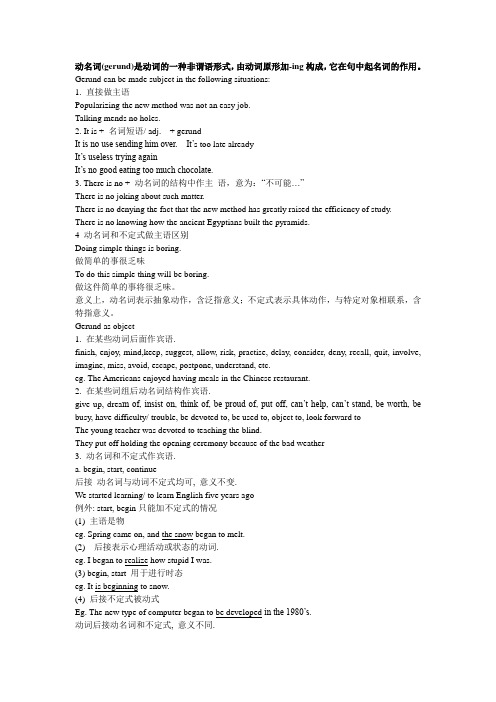
动名词(gerund)是动词的一种非谓语形式,由动词原形加-ing构成,它在句中起名词的作用。
Gerund can be made subject in the following situations:1. 直接做主语Popularizing the new method was not an easy job.Talking mends no holes.2. It is + 名词短语/ adj. + gerundIt is no use sending him over. It’s too late alreadyIt’s useless trying againIt’s no good eating too much chocolate.3. There is no + 动名词的结构中作主语,意为:“不可能…”There is no joking about such matter.There is no denying the fact that the new method has greatly raised the efficiency of study.There is no knowing how the ancient Egyptians built the pyramids.4 动名词和不定式做主语区别Doing simple things is boring.做简单的事很乏味To do this simple thing will be boring.做这件简单的事将很乏味。
意义上,动名词表示抽象动作,含泛指意义;不定式表示具体动作,与特定对象相联系,含特指意义。
Gerund as object1. 在某些动词后面作宾语.finish, enjoy, mind,keep, suggest, allow, risk, practise, delay, consider, deny, recall, quit, involve, imagine, miss, avoid, escape, postpone, understand, etc.eg. The Americans enjoyed having meals in the Chinese restaurant.2. 在某些词组后动名词结构作宾语.give up, drea m of, insist on, think of, be proud of, put off, can’t help, can’t stand, be worth, be busy, have difficulty/ trouble, be devoted to, be used to, object to, look forward toThe young teacher was devoted to teaching the blind.They put off holding the opening ceremony because of the bad weather3. 动名词和不定式作宾语.a. begin, start, continue后接动名词与动词不定式均可, 意义不变.We started learning/ to learn English five years ago例外: start, begin只能加不定式的情况(1) 主语是物eg. Spring came on, and the snow began to melt.(2) 后接表示心理活动或状态的动词.eg. I began to realize how stupid I was.(3) begin, start 用于进行时态eg. It is beginning to snow.(4) 后接不定式被动式Eg. The new type of computer began to be developed in the 1980’s.动词后接动名词和不定式, 意义不同.Eg. try doing 试着try to do 尽力mean doing 意味着mean to do 打算go on to do 接着go on doing 继续stop doing 停止stop to do 停下来做can’t help doing 情不自禁can’t help (to) do 无助于e. need, want, require后接分词主动态和不定式被动式, 都表示被动的意义.The machine needs checking.to be checked.The flowers want watering.to be wateredf. be afraid of 与be afraid to dobe afraid of doing : 害怕某种情况的发生eg. He dared not go home because he was afraid of being scolded by his father.be afraid to do : 不敢去做某事eg. The boy was afraid to go near the dog.g. chance, way, opportunity 等词后接to do 或of + 动名词, 意义无差别.eg. I’d like to take this chance to improve our English.I’d like to take this chance of improving our English.动名词的逻辑主语a. 形容词性物主代词和有生命的名词的所有格My opening the door is permitted.My father’s being ill worried us greatly.Are you suggesting their/ them staying here for the night?I’m quite certain about Elizabeth’s/Elizabeth keeping her promise.c. 动名词的否定,被动及完成式。
动名词用法
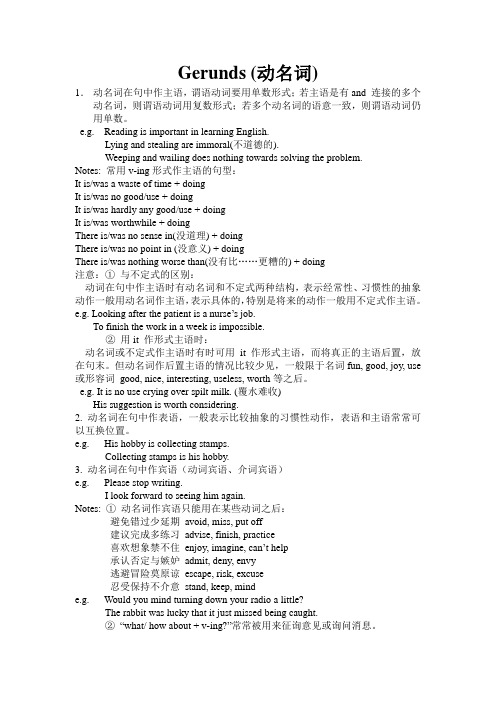
Gerunds (动名词)1.动名词在句中作主语,谓语动词要用单数形式;若主语是有and 连接的多个动名词,则谓语动词用复数形式;若多个动名词的语意一致,则谓语动词仍用单数。
e.g. Reading is important in learning English.Lying and stealing are immoral(不道德的).Weeping and wailing does nothing towards solving the problem.Notes: 常用v-ing形式作主语的句型:It is/was a waste of time + doingIt is/was no good/use + doingIt is/was hardly any good/use + doingIt is/was worthwhile + doingThere is/was no sense in(没道理) + doingThere is/was no point in (没意义) + doingThere is/was nothing worse than(没有比……更糟的) + doing注意:①与不定式的区别:动词在句中作主语时有动名词和不定式两种结构,表示经常性、习惯性的抽象动作一般用动名词作主语,表示具体的,特别是将来的动作一般用不定式作主语。
e.g. Looking after the patient is a nurse’s job.To finish the work in a week is impossible.②用it 作形式主语时:动名词或不定式作主语时有时可用it 作形式主语,而将真正的主语后置,放在句末。
但动名词作后置主语的情况比较少见,一般限于名词fun, good, joy, use 或形容词good, nice, interesting, useless, worth等之后。
Gerunds 高中英语动名词讲解课件 PPT
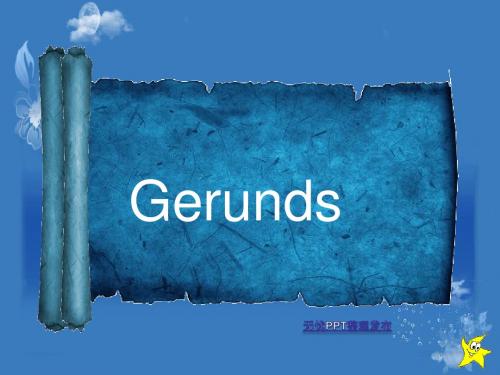
We also use -ing after
give up
Boys, you have to give up smoking.
go on / carry on
We must do something. We can’t go on living like this.
Keep / keep on
Don’t keep pushing me.
• He tried to avoid ______ (answer) my question.
• I don’t fancy _______ (go) out this evening. • Finally my mom forced me ______ (stay) inside the house.
V.
n.
Being a teacher is difficult.
Gerund as subjects
(Being a teacher) is difficult.
subjects
I don’t ski every weekend
because skiing is expensive.
More examples:
The phantom loved singing.
V. n.
Verb + -ing (enjoy doing/stop doing)
I enjoy dancing. (not “I enjoy to dance”) Would you mind closing the door? (not “mind to close”) Ian suggested going to the cinema. (not suggested to go)
how to use gerunds如何使用动名词
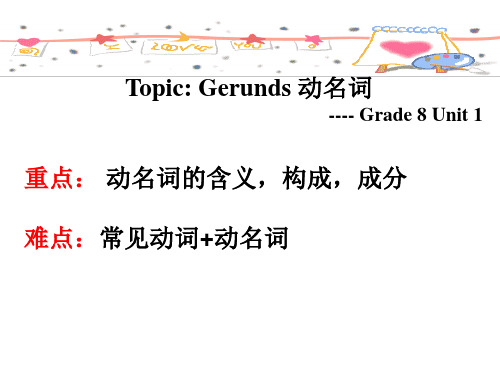
you leave the room. 请你记得离开房间时锁上门。 I remembered locking the door when I left the room. 我记得离开房间时锁门了。
forget to do sth. 忘记去做某事(动 作未发生)
二、作宾语可用来表示一般的习惯或抽 象行为或经常性的动作。
作动词的宾语
I like playing basketball very much. 我非常喜欢打篮球。
表示经常性的动作:一直很 喜欢打篮球
作介词的宾语
Stamps are used for sending letters. 邮票是用来寄信的。
It is a swimming pool. (定语)
本单元主要讲在句中作主语和宾语。
一、作主语时,谓语动词用( 单 )数。
Smiling shows that you are happy. Ballet training usually starts at an early age. Communicating is more than just speaking.
try to do sth. 努力去做某事 try doing sth. 尝试去做某事
Try your best to make every dream come true. 尽你自己最大努力让每一个梦想成真。 We tried speaking English to the foreigners. 我们试着用英语同外国人谈话。
III. 根据所给中文提示完成英语句子,每空 词数不限。
1. I must stop __sm__o_k_i_n_g_ (我必须戒烟了).
人教版中考英语一轮复习+重要考点—动名词(Gerund)讲义及练习

中考英语重要考点——动名词(Gerund)讲义及练习Gerund什么是动名词动名词是动词的另一种非谓语动词形式。
动名词看起来和现在分词完全一样,但是理解两者的区别是很有用的。
动名词的功能总是和名词一样(虽然看起来像动词)。
动名词的用法The gerund as the subject of the sentence作主语动名词短语作主语,属于单数概念ExamplesEating people is wrong.吃人是错误的Hunting tigers is dangerous.猎杀老虎是危险的Flying makes me nervous.飞行让我紧张Brushing your teeth is important.刷牙很重要。
Smoking causes lung cancer.吸烟会导致肺癌。
The gerund as the complement of the verb 'to be'动名词作为动词“to be”的表语ExamplesOne of his duties is attending meetings.他的职责之一是参加会议。
The hardest thing about learning English is understanding the gerund.学习英语中最难的部分是理解动名词。
One of life's pleasures is having breakfast in bed.人生的一大乐趣就是在床上吃早餐。
The gerund after prepositions介词后的动名词当介词后面跟有动词时,必须使用动名词。
一些以介词结尾的短语也是如此,例如“in spite of(尽管)”和“there's no point in(做……没有意义)”。
ExamplesCan you sneeze without opening your mouth?你能不张嘴就打喷嚏吗?She is good at painting.她擅长画画She avoided him by walking on the opposite side of the road.她为了避免碰到他,特意走在了马路的另一边。
英语动名词知识点

英语动名词知识点
英语动名词(Gerunds)是指以-ing 结尾的名词形式,它的功能类似于名词,在句子中可以担任主语、宾语、表语等成分。
以下是英语动名词的一些知识点:
1. 动名词的构成:动名词通常由动词的-ing 形式构成,例如:swimming, playing, studying 等。
2. 动名词的用法:动名词可以作为主语、宾语、表语、定语和状语等。
例如:Swimming is good exercise.(游泳是很好的运动。
)I enjoy reading books.(我喜欢读书。
)
3. 动名词与不定式的区别:动名词和不定式都可以作为动词的名词形式,但它们在用法上有所不同。
动名词通常表示一种持续性的行为或习惯,而不定式则更倾向于表示一种意图或目的。
例如:I like swimming.(我喜欢游泳。
)I want to swim.(我想游泳。
)
4. 动名词的时态和语态变化:动名词本身没有时态和语态的变化,但它可以和助动词一起构成各种时态和语态。
例如:I was swimming.(我正在游泳。
)The book needs proofreading.(这本书需要校对。
)
5. 动名词的常用搭配:动名词可以与不同的介词、动词、形容词等组合使用,构成不同的搭配,例如:interested in, good at, tired of 等。
以上是英语动名词的一些基本知识点,希望对您有所帮助。
如果您还有其他问题,欢迎继续向我提问。
动名词gerund的用1
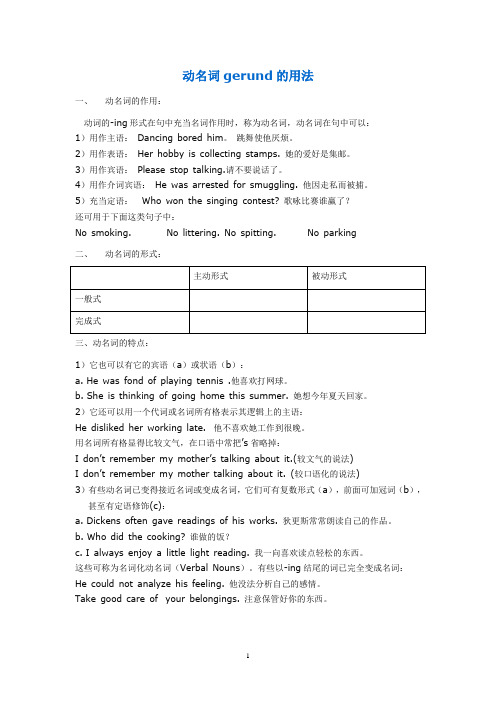
动名词gerund的用法一、动名词的作用:动词的-ing形式在句中充当名词作用时,称为动名词,动名词在句中可以:1)用作主语:Dancing bored him。
跳舞使他厌烦。
2)用作表语:Her hobby is collecting stamps. 她的爱好是集邮。
3)用作宾语:Please stop talking.请不要说话了。
4)用作介词宾语:He was arrested for smuggling. 他因走私而被捕。
5)充当定语:Who won the singing contest? 歌咏比赛谁赢了?还可用于下面这类句子中:No smoking. No littering. No spitting. No parking二、动名词的形式:主动形式被动形式一般式完成式三、动名词的特点:1)它也可以有它的宾语(a)或状语(b):a. He was fond of playing tennis .他喜欢打网球。
b. She is thinking of going home this summer. 她想今年夏天回家。
2)它还可以用一个代词或名词所有格表示其逻辑上的主语:He disliked her working late. 他不喜欢她工作到很晚。
用名词所有格显得比较文气,在口语中常把’s省略掉:I don’t remember my mother’s talking about it.(较文气的说法)I don’t remember my mother talking about it. (较口语化的说法)3)有些动名词已变得接近名词或变成名词,它们可有复数形式(a),前面可加冠词(b),甚至有定语修饰(c):a. Dickens often gave readings of his works. 狄更斯常常朗读自己的作品。
b. Who did the cooking? 谁做的饭?c. I always enjoy a little light reading. 我一向喜欢读点轻松的东西。
unit1gerunds动名词

�
Conclusion: Gerunds as Objects
i: as the object of a verb ii: as the object of a preposition(介词) 介词) 介词
i: advise, delay, escape, avoid, enjoy, consider, finish, deny, keep, mind, practise, suggest, imagine, need, want, require + doing ii: be interested in, feel like, feel sorry about, be afraid of, be shocked at, Have difficulty/trouble in ,+doing
Answers:
1.Only feeling sorry for the phantom of the opera is useless. 2.His job is singing operas before audience. 3.She considered playing the leading role in the next film. 4.The director asked me to pay attention to wearing a smile. 5.The waiting room is always crowded with visi(动名词 动名词) 动名词 The
A: Gerunds as subjects: : B: Gerunds as objects: : C: Gerunds as predicates : D: Gerunds as attributes :
高一英语语法整理总结
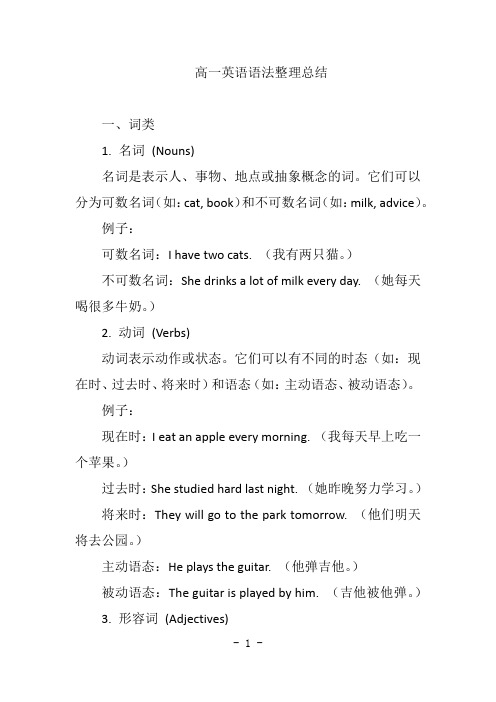
高一英语语法整理总结一、词类1. 名词(Nouns)名词是表示人、事物、地点或抽象概念的词。
它们可以分为可数名词(如:cat, book)和不可数名词(如:milk, advice)。
例子:可数名词:I have two cats. (我有两只猫。
)不可数名词:She drinks a lot of milk every day. (她每天喝很多牛奶。
)2. 动词(Verbs)动词表示动作或状态。
它们可以有不同的时态(如:现在时、过去时、将来时)和语态(如:主动语态、被动语态)。
例子:现在时:I eat an apple every morning. (我每天早上吃一个苹果。
)过去时:She studied hard last night. (她昨晚努力学习。
)将来时:They will go to the park tomorrow. (他们明天将去公园。
)主动语态:He plays the guitar. (他弹吉他。
)被动语态:The guitar is played by him. (吉他被他弹。
)3. 形容词(Adjectives)形容词用来描述或修饰名词或代词。
它们通常位于名词之前。
例子:She has a beautiful house. (她有一座漂亮的房子。
)He is a tall boy. (他是一个高个子男孩。
)4. 副词(Adverbs)副词用来描述动词、形容词或其他副词。
它们通常位于动词之后或形容词之前。
例子:He sings very well. (他唱得很好。
)She spoke quietly in the library. (她在图书馆里轻声说话。
)5. 介词(Prepositions)介词表示名词或代词与句子其他部分之间的关系。
例子:The book is on the table. (书在桌子上。
)She lives in Beijing. (她住在北京。
unit2 Grammar语法 --- Gerunds 动名词(2)

主讲老师:江从泉
Gerunds 动名词(二)
A. Gerunds as subjects 动名词作主语 We can use a gerund as the subject
of a setence
我们可以使用动名词作句子的主语 Smiling shows that you are happy. 微笑显示你很高兴。 Ballet training usually starts at an early age. 芭蕾舞训练通常在很小的年龄开始
1. shake your closed hand/angry S1:What can shaking your closed hand show ? S2: Shaking your closed hand can show that you're angry. 2. rest your head on yur hand /bored
用手托着头/无聊 S1: What can resting your head on your hand?
S2: Resting your head on your hand can show that you'r bored. 3. sigh/sad 叹气;叹息/难过 S1: What can sighing show? S2: Sighing can show that you're sad. 4. close your eyes / thinking 闭上眼睛/思考
S1: What can closing your eyes show? S2: Closing your eyes பைடு நூலகம்an show that you're thinking
动名词 gerunds
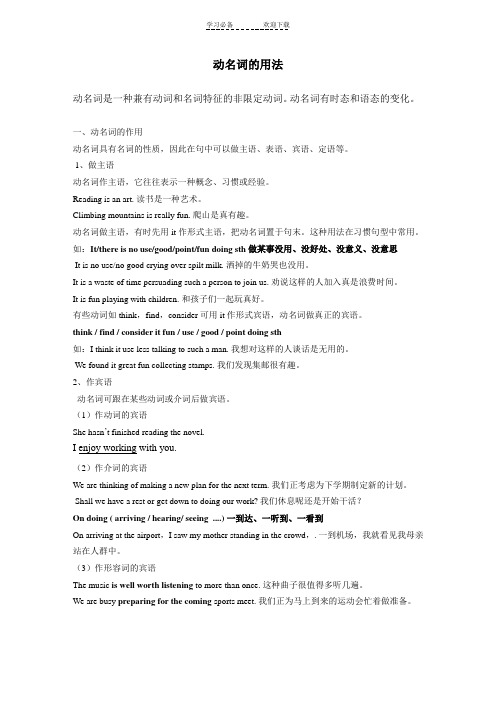
动名词的用法动名词是一种兼有动词和名词特征的非限定动词。
动名词有时态和语态的变化。
一、动名词的作用动名词具有名词的性质,因此在句中可以做主语、表语、宾语、定语等。
1、做主语动名词作主语,它往往表示一种概念、习惯或经验。
Reading is an art. 读书是一种艺术。
Climbing mountains is really fun. 爬山是真有趣。
动名词做主语,有时先用it作形式主语,把动名词置于句末。
这种用法在习惯句型中常用。
如:It/there is no use/good/point/fun doing sth 做某事没用、没好处、没意义、没意思It is no use/no good crying over spilt milk. 洒掉的牛奶哭也没用。
It is a waste of time persuading such a person to join us. 劝说这样的人加入真是浪费时间。
It is fun playing with children. 和孩子们一起玩真好。
有些动词如think,find,consider可用it作形式宾语,动名词做真正的宾语。
think / find / consider it fun / use / good / point doing sth如:I think it use less talking to such a man. 我想对这样的人谈话是无用的。
We found it great fun collecting stamps. 我们发现集邮很有趣。
2、作宾语动名词可跟在某些动词或介词后做宾语。
(1)作动词的宾语She hasn’t finished reading the novel.I enjoy working with you.(2)作介词的宾语We are thinking of making a new plan for the next term. 我们正考虑为下学期制定新的计划。
U2G
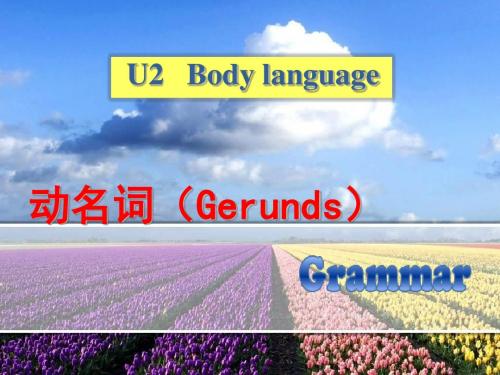
communicate communicating
drop the –e and add -ing
add -ing
drop the –ie and add -ying
Work out the rule
-ing We usually form a gerund by adding _______ to a (2011)-I feel a bit hungry now - Why not ____ for dinner with us? A. go B. did you go C. to go
D. do you go
A
6.As we all know, it’s not polite to keep others ______ for a long time. A. wait B. waiting C. to wait D. waited
巩固练习 1. (2008)From that time on, Mary prictised _______ the piano every day. A. plays B. playing C. played D. to play
B
2.(2009)Mr Green wants to travel around the world because he enjoys _____ new places. A. to see B. seeing C. sees D. see
动名词(Gerunds)
概念:
由“动词+ing”构成;具有名词的功能,所以 叫做动名词。 在句中可作主语、宾语、表语和定语。
动名词作主语
动名词作主语时,谓语动词使用第三人称单数。
e.g. Walking is good exercise. 散步是很好的运动。
Gerunds动名词
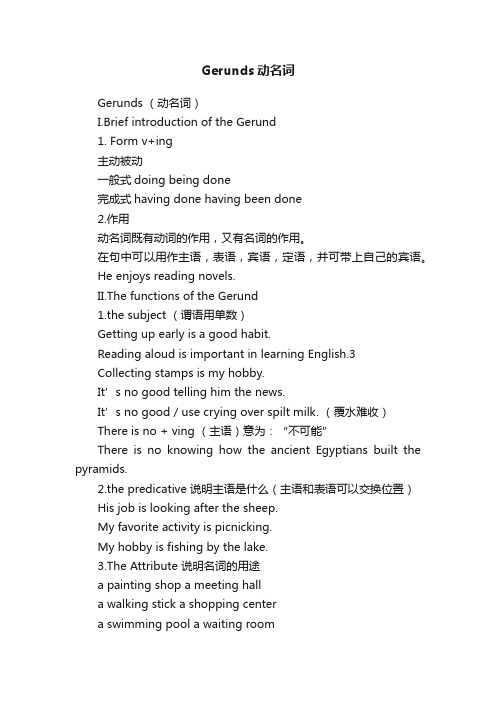
Gerunds动名词Gerunds (动名词)I.Brief introduction of the Gerund1. Form v+ing主动被动一般式doing being done完成式having done having been done2.作用动名词既有动词的作用,又有名词的作用。
在句中可以用作主语,表语,宾语,定语,并可带上自己的宾语。
He enjoys reading novels.II.The functions of the Gerund1.the subject (谓语用单数)Getting up early is a good habit.Reading aloud is important in learning English.3Collecting stamps is my hobby.It’s no good telling him the news.It’s no good / use crying o ver spilt milk. (覆水难收)There is no + ving (主语)意为:“不可能”There is no knowing how the ancient Egyptians built the pyramids.2.the predicative 说明主语是什么(主语和表语可以交换位置)His job is looking after the sheep.My favorite activity is picnicking.My hobby is fishing by the lake.3.The Attribute 说明名词的用途a painting shop a meeting halla walking stick a shopping centera swimming pool a waiting rooma sleeping car a smoking room区别a sleeping car 卧铺车(动名词)a sleeping baby 一个正在睡觉的婴儿(现在分词)4.The Object动词宾语1)+ doingfinish, enjoy, avoid, admit, deny, miss, imagine, save, understand,practise, risk, mind, consider, delay, suggestAfter I finish doing my homework, I went out to play.He didn’t admit stealing the car. (having stolen )We should often practise speaking English.I wonder why he always avoids meeting me.James suggested climbing to the top of the tower to have a view of the whole city.在某些词组或结构后作宾语put off, give up, can’t help, can’t stand, be worthThey put off holding the ceremony because of the bad weather.The film is worth seeing a second time.2)+ doing / to do 意义无区别start, begin, continue注意:在下列情况下start和begin后须接不定式a)后接表示心理活动或状态的动词I began to realize how stupid I was.They started to see the importance of taking the action.b)与用于进行时态It’s beginning to snow.He was just starting to give his lesson when I entered.c)主语是物不是人Spring came on, and the snow began to melt.(融化)He was getting old in years and his hair started to fall.d)后接不定式被动式The dam(水坝)started to be built last year.3)+ doing / to do 意义有区别stop,When the teacher came into the classroom, the students stopped talking at once.When the teacher came into the classroom, the students stopped to listen to her.go on,I was doing my homework before supper. After supper, I went on doing myhomework.I was doing my homework before supper. After supper, I went on to watch TV.remember, forget, regret,I remembered locking the door before I left.Remember to lock the door before you left.try,If no one answers you at the front door, please try knocking at the back door.She didn’t come to school last week because of illness, so now she works harder to try to catch up with the others.meanI mean to see visit my uncle this evening.Missing the train means waiting for an hour.like / love / dislike / hateI like swimming in hot days.I like to swim in such a hot day.preferI prefer to stay at home at night.I prefer staying at home to going outside at night.介词宾语look forward to, stick to, object to, lead to,devote toIs there any hope of catching the early flight?The young teacher was devoted to teaching the blind.Nobody can prevent us from carrying on the job.III.复合结构形容词性物主代词(做主语,宾语)+doing名词所有格(做主语,宾语)+doing名词普通格(做宾语)+doing人称代词宾格(做宾语)+doingPlease excuse me / my interrupting you.Aunt was very happy abou t Xia Fang / Xia Fang’s coming to see her.Your going there will help a lot.Mingming’s being late made the teacher angry.IV.否定结构not + doingTrying without success is better than not trying at all.His mother was angry at his not passing the exam / taking the medicine.V.时态形式1.一般时doingChildren enjoy watching cartoons.The boy insisted on joining the PLA.Do you remember cutting rice on the farm?I shall never forget seeing the famous film star in 1993.2.完成时(也可用一般时)表示的动作在谓语动作之前having doneI regret having been / being unable to write to you.3.被动语态being doneThe naughty boy went out without being permitted.I hate being laughed at.VI.动名词与不定式的用法区别作主语的区别动名词表抽象的动作,含有泛指意义不定式表具体的动作,与特定的对象相联系,含有特指意义。
unit2 Grammar语法 --- Gerunds 动名词(1)
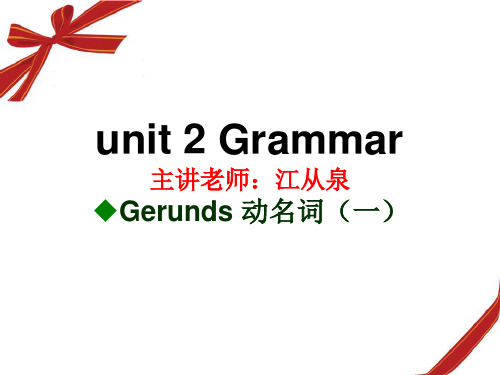
3. 以“辅+元+辅”字母结构结尾的 单词,一般要双写末尾的辅音字母 再加—ing.如:swim---swimming 4. 以字母ie结尾的动词,将ie变为y 再加 ing。如:die---dying Things to remember (要记住的事情)
动名词经常是不可数的,我们 不能在他们前面加a或an 动名词可以有它自己的宾语
unit 2 Grammar
主讲老师:江从泉
Gerunds 动名ห้องสมุดไป่ตู้(一)
Gerunds are nouns ending in-ing. These nouns refer to actions and activities. 动名词是以-ing 结尾的名词。 这些名词描述动作和活动。 Communicating is more than just speaking. 交流不仅仅是说话。
We form gerunds from verbs. Verb Gerund
begin开始 beginning开始 communicate communicating 交流 交流 dance跳舞 dancing跳舞 hold holding 使保持(在某位置) 使保持(在某位置) sigh叹气 sighing叹气
Work out the rule(找出规律) 我们通常通过在动词后加-ing 构成动名词。 动词变现在分词的变化规则 动词变现在分词的规则: 1. 一般情况在词尾加---ing. 如:hold---holding. 2. 以不发音字母e结尾的,去e再 加—ing.如:dance---dancing
Debbie loves reading poems 黛比喜爱阅读诗
gerunds高中英语语法

Practice:
Now we are beginning to see (see) it more clearly. to know (know) the importance of We start English. to snow It began (snow) at midnight. I have begun to play ( play) the piano since 3 o’clock..
Gerunds used as objects
After the following verbs phrases we can only put gerunds: admit, avoid, consider, delay, deny, dislike, enjoy, escape, excuse, fancy, finish, mind, miss, pardon, postpone, practise, propose, suggest, spend (in). can’t help, can’t stand/bear, give up, put off.
常用动名词作宾语句型: have trouble (in) doing… have difficulty (in) doing… have fun (in) doing… have a hard/good time (in) doing… on the point of doing… do some cooking/cleaning/reading… go fishing/swimming/skating…
Gerunds
Gerund as subject
Collecting information 1. _______________ is very important to business. (搜集信息) Being beaten by my mother 2. ______________________ is a torture to me. (被妈妈揍) arguing with him 3. It is on use _______________. (与他争吵) 4. Tom’s working here is what we have expected. ________________ (Tom在这里工作) John’s being killed ______________(John, kill) by the sharks was a shock to us. John’s having been killed
- 1、下载文档前请自行甄别文档内容的完整性,平台不提供额外的编辑、内容补充、找答案等附加服务。
- 2、"仅部分预览"的文档,不可在线预览部分如存在完整性等问题,可反馈申请退款(可完整预览的文档不适用该条件!)。
- 3、如文档侵犯您的权益,请联系客服反馈,我们会尽快为您处理(人工客服工作时间:9:00-18:30)。
2. 后接动名词的常见词组
be worth doing can’t help doing feel like doing give up doing insist on doing succeed in doing (值得…) (情不自禁) (想要做…) (放弃) (坚持做…) (成功做…)
have difficulty/trouble in doing (做…有困难)
permit
advise
recommend
{
+
{regret to do
doing
sb. + to do
5. 动名词的逻辑主语
★ 动名词作主语时,只能用名词或代 词的所有格作动名词的逻辑主语。 Eg: Bob’s / His kidnapping the millionaire’s son was a great shock to us.
3. “to”为介词的短语
be / get used to doing look forward to doing pay attention to doing get down to doing in addition to doing lead to doing (导致) object to doing (反对) stick to doing (坚持)
3.这个工具是用来开启罐头的。
4.她害怕一个人被留在家。 5. 他很惊讶没有被邀请参加晚会。 6. 她从危险中获救让我们喜极而泣。 7.一整天坐在电脑前让我的眼睛很难受。
(作定语表示用途)
Part of Speech
主语 宾语 动名词 表语 定语 状语 补足语
IV. Forms
语态
动名词表示一贯的行为 active passive
时态
一般式 完成式 doing
having done being done having been done
否定形式为not + 动名词
(作主语)
2. My hobby is collecting stamps.
(作表语)
3. I like collecting stamps.
(作及物动词宾语)
4. I look forward to hearing from you.
(作介词宾语)
5. a swimming pool
a walking stick
Unit One Grammar The Gerund
I. Structure
V. + ing 形式
II. Characteristic
兼有动词的特征和名词的功能 III. Functions (part of speech) 主语、谓语、宾语、定语、 状语、补语、表语…?
1. Collecting stamps is my hobby.
4. 又可跟doing又可跟to do
{stop to do
stop doing
{
try doing
try to do
{forget to do
forget doing
{remember to do
remember doing regret doing
{mean to do
allow
mean doing
It作主语时 Reading aloud is very helpful.
做形式主语,动名词作逻辑主语的 固定句型 It is of no use +doing sth. It is no good +doing sth.
It is no use +doing sth.
做宾语
1. 后接动名词的常见动词 finish,enjoy,keep, mind, suggest, avoid,admit, imagine, risk, practise, consider, escape,delay, deny, miss, appreciate, need/ want/ require (以主表被)
★ 动名词作宾语时,可用名词或代词的
所有格或宾格作动名词的逻辑主语。
Eg: You can’t imagine Bob / Bob’s / him / his kidnapping the millionaire’s son.
VI. Exercises (用动名词完成)
1.在阳光下看书没有好处。 2.他正在考虑买台手提电脑。
